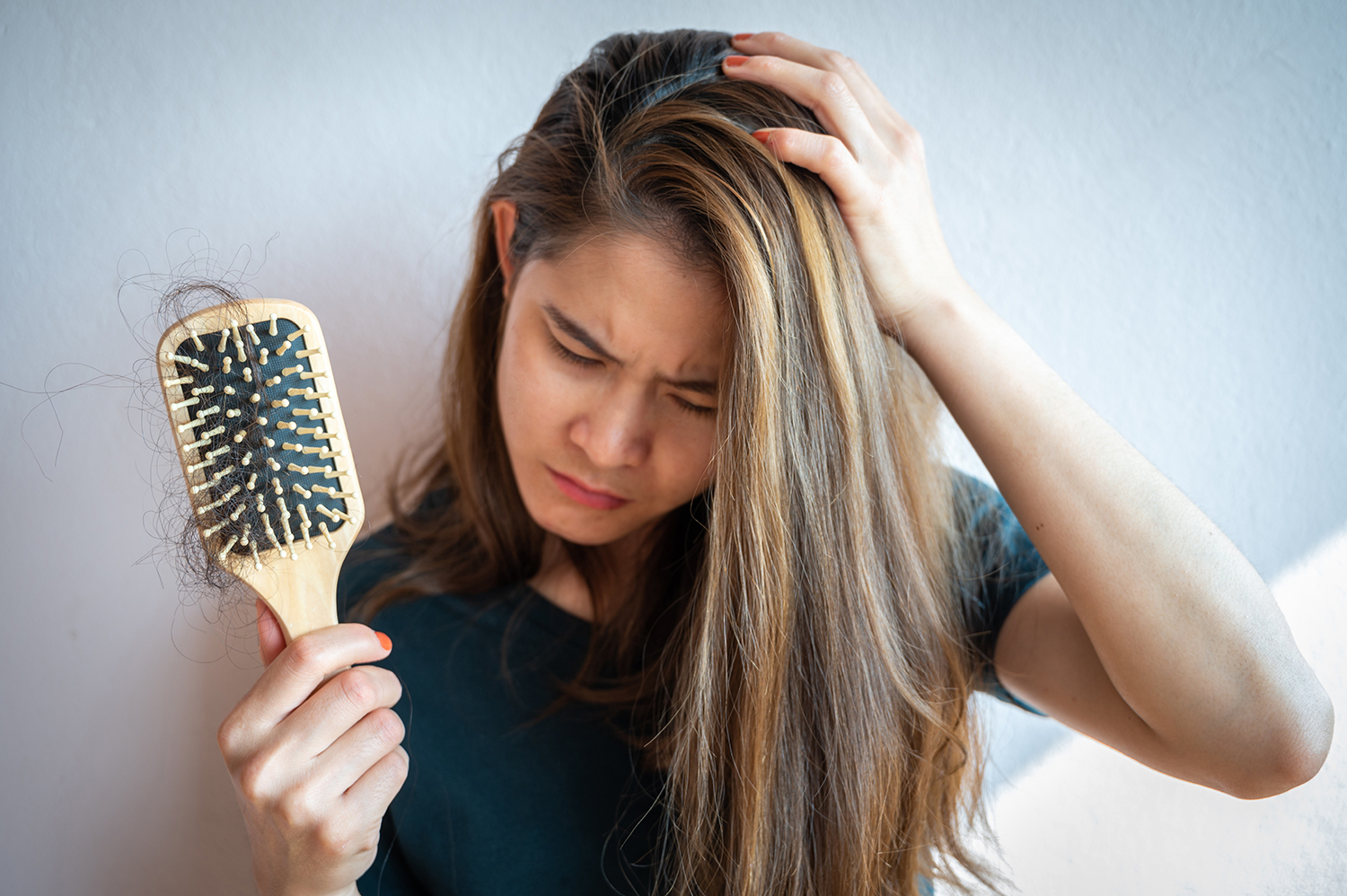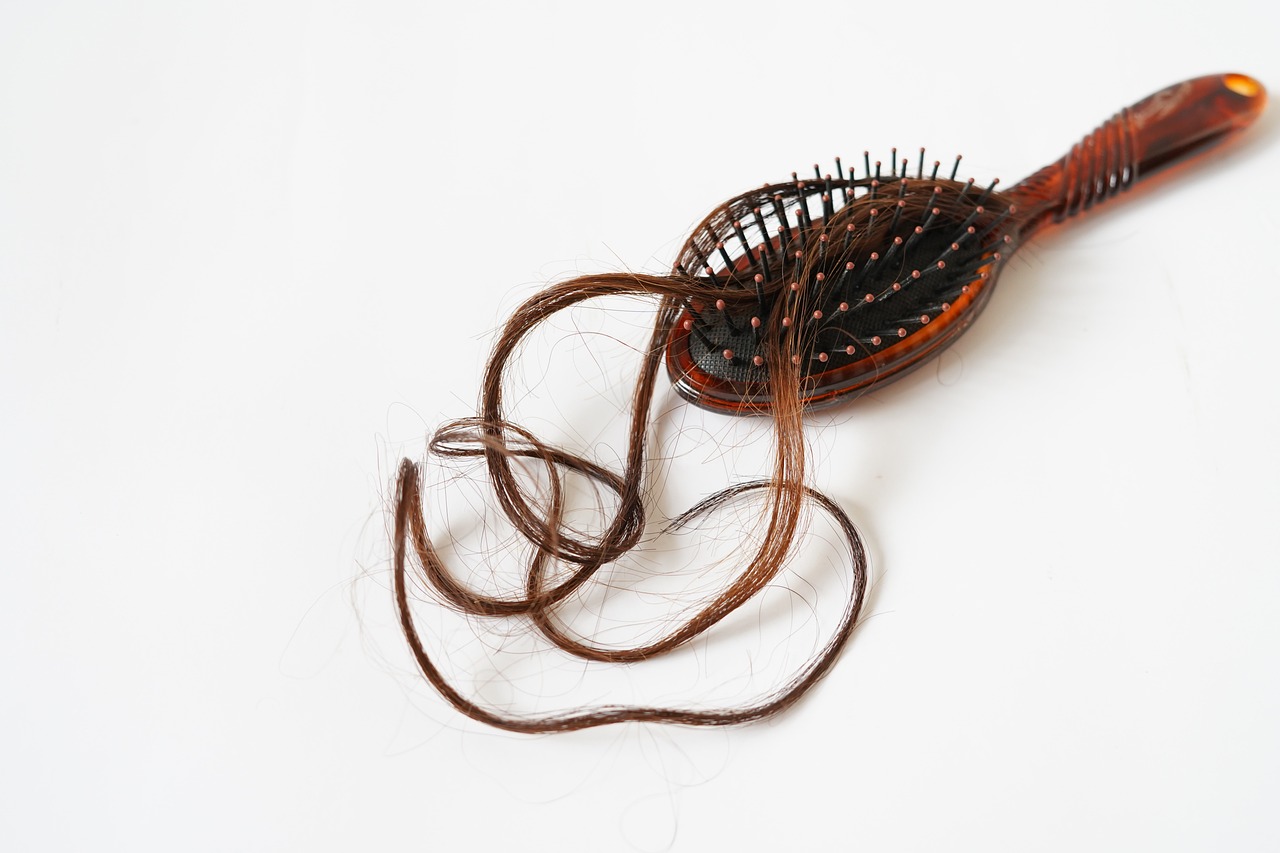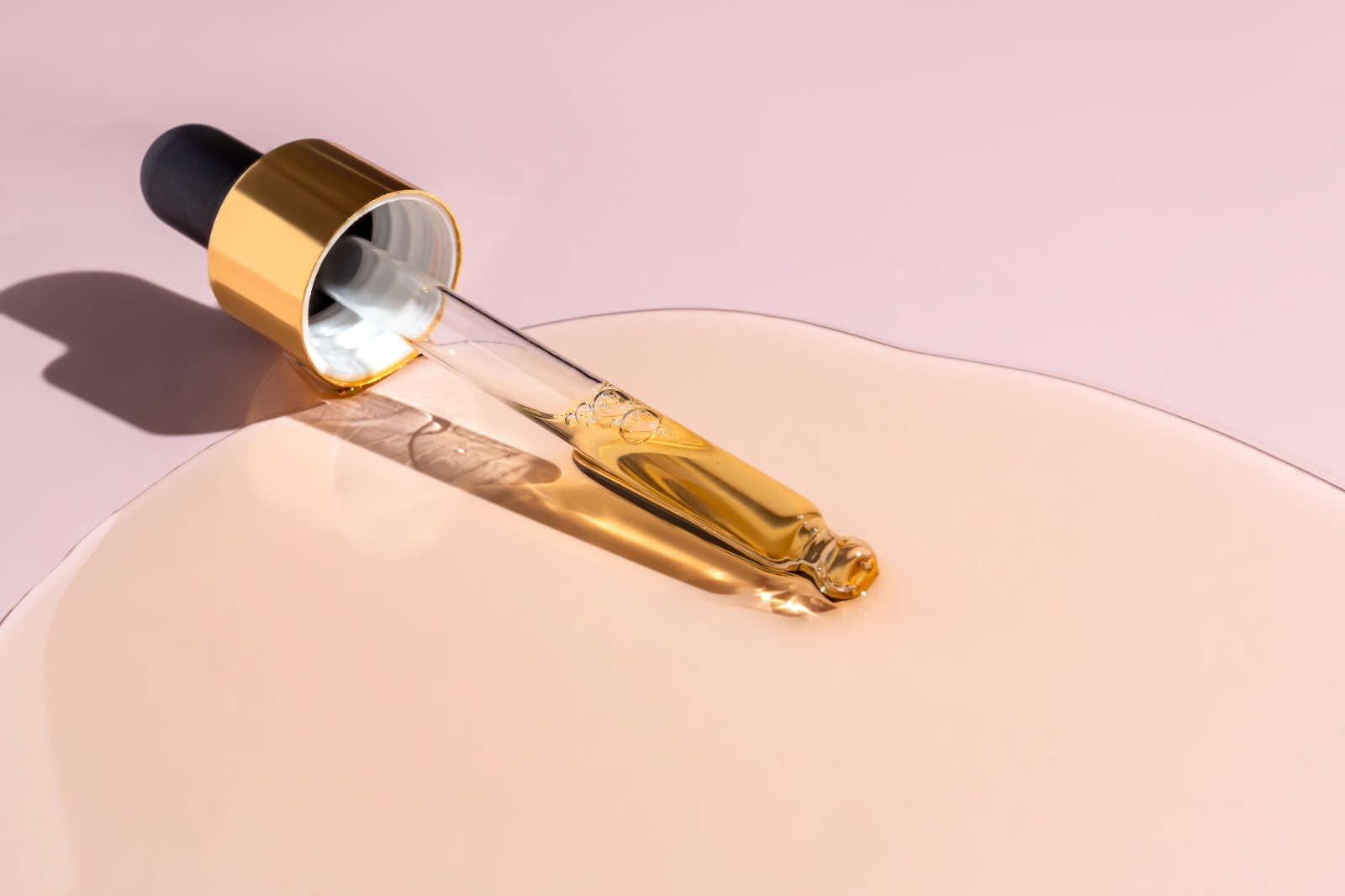Health
Understanding and Managing Telogen Effluvium in Women
Temple hair thinning can be a symptom of Telogen Effluvium in females. Learn more about the condition.#TempleHairThinning #TelogenEffluvium #FemaleHairLoss #HairSymptoms #HairConditions #HairHealth #HairCareTips #HairLossAwareness #HairThinning #HairRegrowth

Hair health is an integral part of our overall well-being, often influencing our self-esteem and confidence. One condition that can significantly impact hair health in women is Telogen Effluvium, a common but often misunderstood form of hair loss. This article aims to shed light on this condition, helping you understand its causes, symptoms, and management strategies.
What is Telogen Effluvium?
Telogen Effluvium (TE) is a type of temporary hair loss that typically occurs after a significant stress event, drastic weight loss, or certain medications. It’s characterized by an increased number of hair follicles entering the resting, or telogen, phase of the hair growth cycle. This shift disrupts the normal balance of hair growth and shedding, leading to a noticeable increase in hair loss. While TE can affect anyone, it’s particularly common in women due to hormonal changes and events like childbirth.
How Do I Know if My Hair Loss is Telogen Effluvium?
Identifying TE can be challenging, as hair loss can be a symptom of various conditions. However, TE is typically characterized by a general thinning of hair rather than distinct bald patches. It often occurs a few months after a stressful event or illness. Other symptoms may include a noticeable increase in hair shedding, particularly during washing or brushing, and a change in the hair’s overall volume. If you’re experiencing significant hair loss and suspect it might be TE, it’s essential to consult a healthcare professional for a proper diagnosis.
The Hair Growth Cycle and Telogen Effluvium
Understanding the hair growth cycle is crucial to understanding TE. The hair growth cycle consists of three phases: anagen (growth), catagen (transition), and telogen (resting). In a healthy hair growth cycle, 85-90% of hairs are in the anagen phase, actively growing, while 10-15% are in the telogen phase, resting before they shed and are replaced by new hair. In TE, a higher percentage of hairs enter the telogen phase prematurely, leading to increased hair shedding and noticeable thinning.
How Long Does Telogen Effluvium Shedding Last?
The duration of TE shedding can vary depending on the individual and the severity of the triggering event. Typically, TE lasts around six months, after which the hair follicles should return to their normal growth cycle. However, in some cases, TE can become chronic, lasting for several years. This is known as Chronic Telogen Effluvium (CTE). CTE can be particularly distressing, but it’s important to remember that help is available, and recovery is possible.
Triggers and Causes of Telogen Effluvium
TE can be triggered by a variety of factors, often linked to physical or emotional stress. Common triggers include severe illness, major surgery, drastic weight loss, certain medications, and hormonal changes such as those experienced during pregnancy or menopause. Nutritional deficiencies, particularly of iron and certain vitamins, can also lead to TE. Understanding these triggers can help in managing and preventing TE.
Biotin Supplement for Hair Health
Biotin, also known as vitamin B7, is often recommended for hair health. A deficiency in biotin can lead to hair thinning, making it a useful supplement for those dealing with TE. This Biotin Supplement supports healthy hair growth by replenishing your body’s biotin levels, promoting stronger and healthier hair.

What is the Fastest Way to Recover from Telogen Effluvium?
Recovery from TE involves addressing the underlying trigger, if possible, and providing your body with the necessary nutrients for hair growth. This includes a balanced diet rich in protein, vitamins, and minerals, adequate sleep, and stress management. Regular exercise can also help by reducing stress levels and improving overall health. In some cases, over-the-counter treatments or prescribed medications may help speed up recovery.
Minoxidil Topical Solution for Hair Growth
Minoxidil is an over-the-counter medication often used to treat hair loss. It works by prolonging the growth phase of hair follicles, promoting hair growth over time. This Minoxidil Topical Solution can be applied directly to the scalp to stimulate hair growth and reduce the effects of TE.

When to Seek Medical Help
If you’re experiencing significant hair loss, it’s important to consult a healthcare professional. They can provide a proper diagnosis and guide you on the appropriate treatment options. If your hair loss is accompanied by other symptoms such as fatigue, skin changes, or weight changes, seek medical help immediately as these could indicate a more serious underlying condition.
Multivitamin Supplement for Overall Health
A comprehensive multivitamin can support overall health, including hair health. Look for one that includes vitamins A, C, D, E, and B-vitamins, as well as minerals like iron and zinc. This Multivitamin Supplement provides a balanced blend of essential nutrients to support your overall health and well-being, including your hair health.

Conclusion
Telogen Effluvium can be a distressing condition, but with understanding and appropriate management, it’s possible to navigate this challenge and support your hair health. Remember, you’re not alone in this journey, and help is available. By recognizing the signs, knowing the triggers, and taking proactive steps towards recovery, you can manage TE effectively and maintain your hair’s health and beauty.
Health
The Top Olaplex Products Every Haircare Routine Needs
Say goodbye to damaged hair and hello to strong, healthy locks! Our ultimate guide to the best #Olaplex products has everything you need for the perfect hair care routine. #hairrepair #hairtreatment #haircaretips #hairhealth #beauty #hairgoals

If you’re on a mission for healthier, stronger hair, you’ve likely come across the brand Olaplex. Known for its innovative hair care products, Olaplex has taken the beauty world by storm with its ability to repair and strengthen damaged hair. The brand’s patented technology helps to rebuild and reconnect broken hair bonds, which are often caused by heat damage, chemical treatments, or environmental stressors. By targeting these bonds, Olaplex can help to restore hair health, reduce breakage, and improve the overall look and feel of your hair.
Whether you’re dealing with hair damage, breakage, frizz, or you simply want to maintain your hair’s health, Olaplex has a product for you. In this article, we’ll explore the best Olaplex products for all hair types and concerns, so you can achieve the hair of your dreams. From Olaplex’s famous No. 3 Hair Perfector to the newest No. 0 Intensive Bond Building Hair Treatment Kit, we’ll cover everything you need to know about Olaplex and its benefits. So, if you’re ready to discover the best Olaplex products for healthy, beautiful hair, keep reading!
What is Olaplex?
The brand was founded by two chemists, Dr. Eric Pressly and Dr. Craig Hawker, who set out to create a solution to one of the most common problems faced by their clients – damaged hair. Olaplex is a revolutionary brand of hair care products that has become a go-to for stylists and individuals alike and has gained a cult following for its ability to repair and strengthen damaged hair. The brand’s product line includes shampoos, conditioners, and treatments that are designed to work together to improve hair health and prevent further damage.
At the heart of Olaplex’s products is a patented active ingredient called bis-aminopropyl diglycol dimaleate. This active ingredient is a unique molecule that is able to target and repair broken hair bonds within the hair shaft. When hair is damaged through heat styling, chemical treatments, or environmental stressors, these bonds can become weakened or broken, resulting in hair that looks and feels dry, brittle, and damaged.
Olaplex’s products work by penetrating deep into the hair shaft to restore and rebuild these broken bonds, helping to improve hair strength, reduce breakage, and enhance the overall look and feel of your hair. Unlike traditional hair care products, which often simply mask the damage, Olaplex products work from within the hair to restore its natural strength and resilience.
Olaplex’s product line includes the famous No. 3 Hair Perfector, an at-home treatment designed to strengthen hair and prevent breakage, as well as the No. 4 Bond Maintenance Shampoo, No. 5 Bond Maintenance Conditioner, and No. 6 Bond Smoother, which are all designed to maintain hair health and prevent further damage. The brand also offers the No. 0 Intensive Bond Building Hair Treatment Kit, a pre-shampoo treatment designed to prime hair for maximum repair, and the No. 8 Bond Intense Moisture Mask, a highly moisturizing hair mask that is designed to provide intense hydration and repair for damaged hair.
Overall, Olaplex’s products have become a go-to for those looking to improve the health and appearance of their hair. With their innovative technology and targeted approach to hair repair, it’s no wonder that so many people have become devoted fans of the brand.
What Olaplex should I try first?
If you’re new to the world of Olaplex and not sure where to start, the No. 3 Hair Perfector is a great first step. This at-home treatment is designed to strengthen and repair damaged hair, making it a good starting point for anyone looking to improve the health of their hair.
To use Olaplex No. 3, simply apply the treatment to damp hair before shampooing, leave it on for at least 10 minutes (or up to 90 minutes for more intense repair), and then rinse it out and follow up with your regular shampoo and conditioner. By incorporating this treatment into your weekly hair care routine, you can start to see the benefits of Olaplex and begin to repair the damage caused by chemical treatments or environmental factors.
If you have specific hair concerns, such as color-treated hair, there are other Olaplex products that may be better suited to your needs. For example, the No. 4 Bond Maintenance Shampoo and No. 5 Bond Maintenance Conditioner are specifically designed to maintain the health of color-treated hair, while the No. 6 Bond Smoother can help to reduce frizz and improve hair manageability.
For those with severely damaged hair, the No. 0 Intensive Bond Building Treatment is another option to consider. This pre-shampoo treatment is designed to be used in conjunction with the No. 3 Hair Perfector and is formulated to help rebuild and strengthen the bonds in extremely damaged hair.
Ultimately, the best Olaplex product to try first will depend on your individual hair concerns and needs. However, for most people, the No. 3 Hair Perfector is a great starting point and can help to improve the health and appearance of hair over time.

What’s the best Olaplex treatment?
If you’re looking for a more intensive Olaplex treatment, the No. 0 Intensive Bond Building Hair Treatment Kit is a popular choice. This kit includes the No. 0 Intensive Bond Building Treatment and the No. 3 Hair Perfector, which work together to help rebuild and strengthen damaged hair.
The No. 0 treatment is designed to be used before the No. 3 Hair Perfector and is formulated to help rebuild and strengthen the bonds in extremely damaged hair. It is a pre-shampoo treatment that is applied to dry hair and left on for 10 minutes before being rinsed out and followed up with the No. 3 treatment.
The No. 3 Hair Perfector is then applied to damp hair, left on for at least 10 minutes (or up to 90 minutes for more intense repair), and then rinsed out and followed up with shampoo and conditioner. By using these two treatments together, you can achieve even more intense repair and strengthening of your hair.
While the No. 0 and No. 3 treatments are more intensive options, they can be a great choice for those with severely damaged or chemically-treated hair. However, it’s important to note that these treatments are not a one-time fix, and will require consistent use over time to see results.
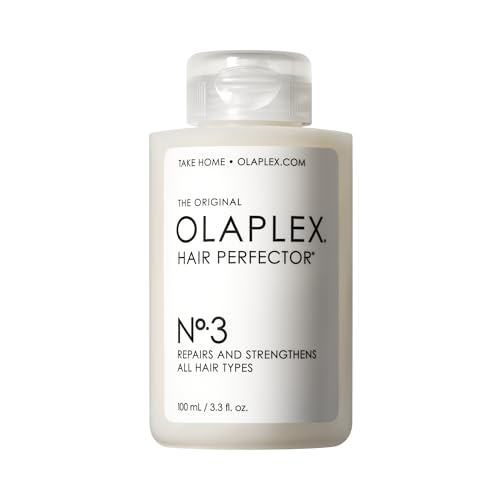
Which Olaplex do hairdressers use?
Hairdressers and salon professionals often use Olaplex No. 1 and No. 2 as in-salon treatments during coloring and chemical treatments. These two products are only available for professional use and are not sold directly to consumers.
Olaplex No. 1 Bond Multiplier is a concentrated treatment that is added to lightener, color, or chemical services to help prevent hair damage during the coloring process. It is typically mixed in with the coloring or lightening formula and applied to the hair in the same way that a regular coloring or lightening service would be done.
After the coloring or chemical treatment is complete, Olaplex No. 2 Bond Perfector is then applied to the hair. This treatment helps to further repair any bonds that may have been broken during the coloring or chemical process. It is left on the hair for a minimum of 10 minutes before being rinsed out and followed up with shampoo and conditioner.
While Olaplex No. 1 and No. 2 are not available for at-home use, they are an important part of many salon professionals’ toolkits for protecting and repairing clients’ hair during coloring and chemical treatments.

How to use Olaplex products at home?
If you’re looking to repair and strengthen your hair, Olaplex products can be a great addition to your hair care routine. While Olaplex is known for its in-salon professional treatments, there are also several products that you can use at home to improve the health and appearance of your hair. Whether you’re dealing with damaged hair from heat styling or color treatments, or just looking to give your hair an extra boost of strength and hydration, incorporating Olaplex into your hair care routine can be a game-changer.
To use Olaplex, follow these steps:
- Start with clean, towel-dried hair: It’s important to start with clean, damp hair when using Olaplex products.
- Apply the product: Depending on the specific Olaplex product you are using, follow the instructions for how much to use and where to apply it. For example, Olaplex No. 3 Hair Perfector should be applied to damp hair from roots to ends, while Olaplex No. 0 Intensive Bond Building Hair Treatment Kit is applied to dry hair before shampooing.
- Let the product sit: Most Olaplex products need to be left on the hair for a certain amount of time. Follow the instructions carefully and set a timer to ensure that you leave the product on for the correct length of time.
- Rinse out the product: After the recommended amount of time has passed, rinse the product out thoroughly with warm water.
- Shampoo and condition: After rinsing out the Olaplex product, shampoo and condition your hair as you normally would.
- Style as desired: Once you have finished washing your hair, you can style it as you normally would.
However, it’s important to note that using Olaplex products at home does require some care and attention to detail. Different Olaplex products have different instructions and usage guidelines, and it’s important to follow them closely in order to achieve the best results. In the following sections, we’ll go over some general tips and guidelines for using Olaplex products at home, as well as specific instructions for some of the most popular products.
The 5 best Olaplex products for damaged hair.
If you’ve been struggling with damaged hair from chemical treatments, heat styling, or other factors, you may be looking for products to help restore your hair’s health and strength. Olaplex is a popular hair care brand that is known for its ability to repair and strengthen damaged hair. With a range of products designed for different hair types and concerns, Olaplex has become a go-to brand for many people looking to improve the health and appearance of their hair. In this article, we’ll be highlighting 5 of the best Olaplex products for damaged hair, and explaining how they can help repair and strengthen your hair.

Olaplex Hair Perfector No 3
Olaplex No. 3 Hair Perfector
Olaplex No. 3 Hair Perfector Is a treatment that is applied to the hair after shampooing and left in for a period of time before rinsing out. This product is formulated to help repair and rebuild the bonds in the hair that are damaged by heat styling, coloring, and other chemical treatments. It is suitable for all hair types and can be used on both natural and chemically treated hair. If you have damaged hair and are looking for a product to help repair and strengthen it, the Olaplex No. 3 Hair Perfector may be a good option to try.

Olaplex No. 4 Bond Maintenance Shampoo
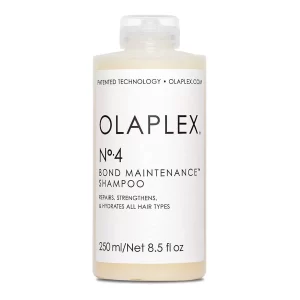
Olaplex No. 4 Bond Maintenance Shampoo
Olaplex No. 4 Bond Maintenance Shampoo Is part of a hair care line developed by Olaplex, a company that specializes in hair repair products. The shampoo is formulated to help repair damaged hair and prevent further damage from occurring. It works by penetrating the hair shaft and targeting damaged bonds within the hair. The active ingredient, Bis-Aminopropyl Diglycol Dimaleate, helps to repair and rebuild these damaged bonds, resulting in healthier, stronger hair. In addition to its repairing properties, Olaplex No. 4 Bond Maintenance Shampoo is also designed to nourish and hydrate the hair, leaving it feeling soft and smooth. It is free from sulfates, parabens, and phthalates, making it suitable for all hair types, including color-treated hair. The shampoo is recommended for use in conjunction with other Olaplex products, such as the No. 3 Hair Perfector and No. 5 Bond Maintenance Conditioner, for optimal results.

Olaplex No. 5 Bond Maintenance Conditioner
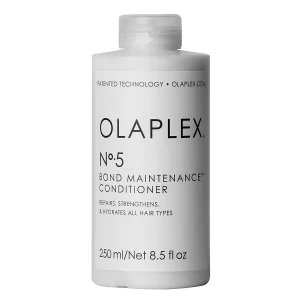
Olaplex No. 5 Bond Maintenance Conditioner
Olaplex No. 5 Bond Maintenance Conditioner Is a hair care product specifically formulated to help repair and strengthen damaged hair. It contains Bis-Aminopropyl Diglycol Dimaleate, a patented active ingredient that works to repair broken bonds in the hair that can be caused by various forms of damage such as chemical treatments and heat styling. In addition to this key ingredient, the conditioner also includes nourishing ingredients like argan oil and panthenol to moisturize and care for the hair. Many users have found that Olaplex No. 5 Bond Maintenance Conditioner effectively helps to improve the overall health and appearance of damaged hair.

Olaplex No. 6 Bond Smoother
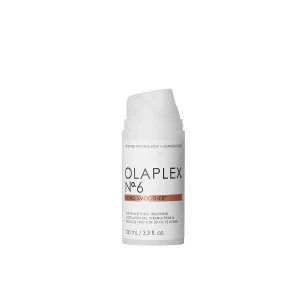
Olaplex No 6 Bond Smoother
Olaplex No. 6 Bond Smoother This is a leave-in styling cream hair treatment designed to smooth and protect the hair, helping to reduce frizz and flyaways while repairing and strengthening damaged hair. It is formulated with patented OLAPLEX Bond Building Chemistry, which helps to repair and rebuild the hair’s broken bonds caused by chemical, thermal, and mechanical damage. This can help to improve the overall health and appearance of damaged hair, making it look smoother, stronger, and more moisturized. To use Olaplex No. 6 Bond Smoother, apply a small amount to damp hair and distribute evenly. Leave it on for at least 10 minutes, then rinse thoroughly and style as desired.

Olaplex No. 7 Bonding Oil

Olaplex No.7 Bonding Oil
Olaplex No. 7 Bonding Oil Is alight weight nourishing oil hair treatment product that is designed to help to repair and strengthen damaged hair while adding shine and helping to protect against heat styling, formulated with a blend of ingredients that work to restore the bonds within the hair that can be damaged by heat styling, chemical treatments, and environmental factors. When applied to the hair, the oil helps to nourish and moisturize the hair, leaving it feeling soft and healthy. It can be used on all hair types and can be applied to damp or dry hair. Some people have reported that it has helped to reduce breakage and improve the overall health and appearance of their hair. However, as with any hair care product, results may vary depending on the individual and the specific condition of their hair.

In conclusion
Olaplex is a brand that has revolutionized the hair care industry by offering products that help to repair and protect damaged hair. Whether you have chemically treated hair, heat-damaged hair, or just want to prevent future damage, Olaplex has a range of products that can help.
If you’re new to Olaplex, a good product to start with is the Olaplex No. 3 Hair Perfector. This product can help to strengthen and repair your hair, leaving it feeling softer and more manageable. If you’re looking for an intensive treatment, the Olaplex No. 0 Intensive Bond Building Hair Treatment Kit can help to give your hair a boost in just one use.
For those who visit a salon, Olaplex No. 1 and No. 2 are important products that are used by hairdressers during coloring and chemical treatments. These in-salon treatments can help to protect hair from damage and breakage.
To incorporate Olaplex into your hair care routine, start by using the Olaplex No. 3 Hair Perfector once a week. For an even more intensive treatment, use the Olaplex No. 0 Intensive Bond Building Hair Treatment Kit before the No. 3 treatment. You can also ask your hairdresser about using Olaplex No. 1 and No. 2 during your next salon visit.
Overall, Olaplex offers a range of products to help repair and protect hair from damage. By incorporating these products into your hair care routine, you can help to keep your hair looking and feeling healthy and beautiful.
Health
Scalp Massage Brush Benefits
Scalp massage is a game changer! Try scalp massage brush today! ?♂️?♀️#scalpmassage #haircare #strongstrands #longhair #beautycare #hairtreatment #scalphealth #scalpbrush #hairgrowth #healthyhair #nourishscalp #scalptreatment #relaxation

A scalp massage brush is a tool that is designed to be used on the scalp to massage and stimulate the scalp. It is typically made of a handle with a head that is covered in bristles or teeth. Some scalp massage brushes are manual and are used by moving the brush in circular motions over the scalp, while others are electric and use vibration to massage the scalp.
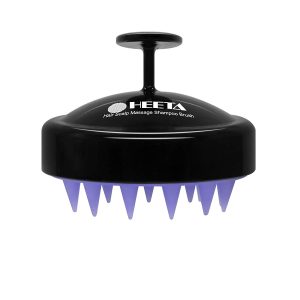
Hair Shampoo Brush, HEETA Scalp Care Hair Brush with Soft Silicone Scalp Massager (Black)
There are several types of scalp massage brushes available, including those made with soft bristles for a gentle massage, and those with firmer bristles for a more invigorating massage. Some scalp massage brushes are designed for use on wet or dry hair, while others are specifically made for use on dry hair.
Scalp massage brushes are often used to improve circulation to the scalp, exfoliate the scalp, and improve the texture of the hair. They may also be used to reduce stress and tension, and to help reduce dandruff by removing dead skin cells and promoting a healthy scalp environment. It’s important to use a scalp massage brush gently and not apply too much pressure to avoid damaging the scalp or hair. It’s also a good idea to consult with a dermatologist or hair care professional before using any new hair care product or tool.
Scalp massage brush benefits
Scalp brushes can have a number of potential benefits, including:
Improved circulation
Improved circulation: Massaging the scalp with a brush can help to stimulate blood flow to the scalp, which may help to promote healthy hair growth. Improved circulation can also help to nourish the hair follicles and scalp, which may help to improve the overall health and appearance of the hair.
Improved circulation may also help to reduce inflammation and improve the scalp’s overall health. Inflammation can be a contributing factor to hair loss and other scalp conditions, so reducing inflammation can help to prevent these issues and promote healthy hair growth.
There are several ways to enhance the circulation-boosting effects of a scalp brush, such as:
- Using essential oils that stimulate circulation: Certain essential oils, such as peppermint and rosemary oil, are known for their circulation-boosting properties. Adding a few drops of these oils to the brush before massaging the scalp can enhance the circulation-boosting effects of the brush.
- Incorporating scalp massages into a regular hair care routine: Regular scalp massages can help to stimulate circulation to the scalp and promote healthy hair growth.
- Using a scalp brush with vibration: Some scalp brushes are designed with vibration technology, which can help to further stimulate circulation to the scalp.
Exfoliation
Some scalp brushes are designed with bristles that can help to exfoliate the scalp, removing dead skin cells and promoting a healthy scalp environment. Exfoliating the scalp can help to unclog pores and remove excess oil and dirt, which may help to prevent dandruff and other scalp conditions.
Exfoliating the scalp can also help to improve the overall health and appearance of the hair by removing build-up and impurities that can weigh the hair down and make it look and feel dull. By regularly exfoliating the scalp, you may notice that your hair looks and feels softer, shinier, and more manageable.
There are several ways to enhance the exfoliating effects of a scalp brush, such as:
- Using a scalp scrub: Scalp scrubs are products that are specifically formulated to exfoliate the scalp. They contain small particles that help to remove dead skin cells and other impurities from the scalp.
- Using an exfoliating hair mask: Exfoliating hair masks contain ingredients that help to remove impurities and build-up from the scalp and hair. These masks are usually applied to the hair after shampooing and left on for a certain amount of time before being rinsed out.
- Using essential oils: Certain essential oils, such as tea tree oil and peppermint oil, are known for their exfoliating properties. Adding a few drops of these oils to the brush before massaging the scalp can enhance the exfoliating effects of the brush.
Relaxation
Scalp massages using a brush can provide a relaxing experience that can help to reduce stress and tension. The gentle motion of the brush on the scalp can help to soothe the mind and promote feelings of calm and relaxation. This can be especially helpful for individuals who experience high levels of stress or tension, as these factors can contribute to hair loss and other scalp conditions.
- Incorporating scalp massages with a brush into a self-care routine may help to improve the health and appearance of the hair while also reducing stress. Scalp massages can be a simple and enjoyable way to take care of both the mind and body.
- There are several ways to enhance the relaxation experience of scalp massages, such as:
- Using essential oils that promote relaxation: Certain essential oils, such as lavender and chamomile, are known for their calming properties. Adding a few drops of these oils to the brush before massaging the scalp can enhance the relaxation experience.
- Setting the mood: Creating a relaxing atmosphere can also help to enhance the relaxation experience of scalp massages. This may include dimming the lights, playing soothing music, or lighting a candle.
- Incorporating scalp massages into a self-care routine: Scheduling regular scalp massages as part of a self-care routine can help to reduce stress and promote relaxation.
Improved hair texture
Massaging the scalp with a brush may help to improve the texture of the hair by distributing the natural oils produced by the scalp more evenly through the hair. This can help to nourish the hair and make it look and feel softer, shinier, and more manageable.
The scalp produces a natural oil called sebum, which is responsible for keeping the scalp and hair hydrated and healthy. When the scalp is not properly nourished, the hair can become dry, brittle, and prone to breakage. By massaging the scalp with a brush and distributing the natural oils more evenly through the hair, you may be able to improve the overall health and appearance of the hair.
In addition to using a scalp brush, there are other ways to improve the texture of the hair, such as:
- Using hair care products that are formulated for your specific hair type: Different hair types have different needs, so it’s important to use products that are tailored to your specific hair type. For example, if you have dry hair, you may benefit from using a nourishing shampoo and conditioner that is formulated for dry hair.
- Using a deep conditioning treatment: Deep conditioning treatments can help to nourish and hydrate the hair, improving its texture and appearance. These treatments are usually applied to the hair after shampooing and left on for a certain amount of time before being rinsed out.
- Using a leave-in conditioner: Leave-in conditioners are designed to be applied to the hair after washing and left in to provide ongoing nourishment and protection. They can help to improve the texture of the hair and make it easier to style.
- It’s important to use a scalp brush gently and not apply too much pressure, and to consult with a dermatologist or hair care professional before using any new hair care product or technique.
Reduced dandruff
Massaging the scalp with a brush may help to reduce dandruff by removing dead skin cells and promoting a healthy scalp environment. Dandruff is often caused by an overproduction of oil or an accumulation of dead skin cells, so exfoliating the scalp with a brush can help to keep these issues in check and prevent dandruff from forming.
there are other ways to reduce dandruff, such as:
- Using a dandruff shampoo: Dandruff shampoos contain ingredients that help to control dandruff by reducing excess oil production and removing dead skin cells from the scalp. It’s important to choose a dandruff shampoo that is formulated for your specific hair type to avoid over-drying the scalp.
- Avoiding harsh hair care products: Harsh hair care products, such as those with high levels of alcohol or sulfates, can strip the scalp of its natural oils and lead to dandruff. Choosing hair care products that are gentle and nourishing can help to prevent dandruff.
- Keeping the scalp clean: Regularly washing the hair and scalp with a gentle shampoo can help to remove excess oil and prevent dandruff from forming.
In conclusion
In conclusion, Scalp massage brushes have several of potential benefits for both the scalp and the hair. Improved circulation is one potential benefit of scalp massages. When you massage the scalp, you are gently manipulating the skin and underlying tissues, which can help to increase blood flow to the area. This increased circulation may bring more nutrients and oxygen to the hair follicles, which can support healthy hair growth. Additionally, improved circulation may help to remove waste products and toxins from the scalp, which can promote a healthy environment for hair growth.
Scalp massage brushes can also be relaxing and may help to reduce stress and tension. Stress and tension can have a negative impact on overall health and well-being, and they can also affect the health of the scalp and hair. By reducing stress through scalp massages, you may be able to promote a sense of overall well-being and improve the health of the scalp and hair.
Finally, scalp massage brushes may stimulate the hair follicles, which may help to promote hair growth. When the scalp is massaged, it may stimulate the production of natural oils, which can nourish the hair and scalp. This, in turn, may help to support healthy hair growth. However, it’s important to note that more research is needed to fully understand the effects of scalp massages on hair growth.
Health
The psychological impact of hair loss and how to cope with it
Feeling stressed about hair loss? We’ve got you covered with our tips for managing thinning hair. #hairloss #baldness #thinninghair #hairtroubles #haircaretips #goodbyebadhairdays #expertadvice #hairlosssolutions

Losing one’s hair can be a difficult and emotionally challenging experience, particularly for individuals who place a high value on their appearance and who feel that their hair is a key part of their identity. The psychological impact of hair loss can be significant and may include feelings of low self-esteem, sadness, and even depression. It is not uncommon for individuals experiencing hair loss to feel self-conscious and anxious about their appearance in social situations.
These negative emotions and self-perceptions can be difficult to cope with and may lead to a decline in overall well-being and quality of life. It is important for individuals experiencing hair loss to seek support and explore treatment options in order to manage the psychological impact of this condition.
There are several things that can help people cope with hair loss:
- Seek support: It can be helpful to talk to friends and family about your feelings. You may also find it helpful to join a support group or seek the guidance of a mental health professional.
- Adjust your expectations: It’s important to accept that hair loss is a natural part of life and to try not to place too much value on your appearance. Instead, focus on your other positive qualities and attributes.
- Explore treatment options: There are several treatments available that can help slow or stop hair loss, or even promote new hair growth. Consult a dermatologist or other medical professional to determine the best treatment options for your specific situation.
- Try a new hairstyle: Changing your hairstyle can help you feel more confident and comfortable with your hair loss. Consider consulting with a stylist to find a new look that works for you.
- Practice self-care: Take care of yourself by getting plenty of rest, eating a healthy diet, and engaging in activities that you enjoy. These things can help improve your overall well-being and help you cope with the stress of hair loss.
Seek support
Seeking support is an important step in coping with the psychological impact of hair loss. There are several options for finding support:
-
Talk to friends and family:
Sharing your feelings with loved ones can provide a sense of comfort and understanding. They may also be able to offer practical support and suggestions for coping with hair loss. -
Join a support group:
There are many online and in-person support groups available for people experiencing hair loss. These groups can provide a sense of community and a safe space to share your feelings and experiences with others who understand what you are going through. -
Seek the guidance of a mental health professional:
A therapist, counselor, or other mental health professionals can provide additional support and guidance for coping with the psychological impact of hair loss. They can help you develop strategies for managing negative emotions and improving self-esteem. -
Consider medication:
In some cases, medication may be necessary to help manage the emotional impact of hair loss. A mental health professional can assess your situation and determine if medication is appropriate for you.
It is important to remember that seeking support is a personal decision, and it is okay if one option does not work for you. It may take some time and experimentation to find the right support system that works for you.
Adjust your expectations
Adjusting your expectations and reframing your perspective can be helpful in coping with the psychological impact of hair loss. It is important to recognize that hair loss is a natural part of life and to try not to place too much value on your appearance. Instead, focus on your other positive qualities and attributes.
Here are a few strategies for adjusting your expectations:
-
Practice gratitude:
Focusing on the things that you are grateful for can help shift your focus away from your hair loss and onto the positive aspects of your life. -
Set realistic goals:
It can be helpful to set goals for yourself that are achievable and that focus on personal growth and well-being rather than appearance. -
Learn to accept compliments:
It can be difficult to accept compliments when you are feeling self-conscious about your hair loss, but it is important to try to receive them graciously and to remind yourself that you are more than just your hair. -
Seek out role models:
Look for people who have successfully coped with hair loss and who have found ways to embrace their appearance and live full and meaningful lives.
Remember, it is normal to have ups and downs as you adjust to hair loss, and it is okay to allow yourself time to grieve the loss of your hair. But by focusing on your other strengths and attributes and finding ways to accept and embrace your new appearance, you can learn to cope with hair loss and move forward with confidence.
Explore treatment options
Exploring treatment options is another important step in coping with the psychological impact of hair loss. There are several treatments available that can help slow or stop hair loss, or even promote new hair growth. The most appropriate treatment option for you will depend on the cause and severity of your hair loss.
Here are a few options to consider:
-
Medications:
There are several medications that are approved by the US Food and Drug Administration (FDA) to treat hair loss. These include minoxidil (Rogaine), finasteride (Propecia), and dutasteride (Avodart). These medications can be taken orally or applied topically and may be used alone or in combination. -
Hair transplant surgery:
Hair transplant surgery involves the removal of hair-bearing skin from one area of the scalp and transplanting it to an area of thinning or balding. This procedure is usually performed by a dermatologist or plastic surgeon. -
Scalp micropigmentation:
Scalp micro pigmentation involves the use of pigment to create the illusion of a full head of shaved hair. This procedure is typically performed by a trained technician. -
Wigs and hairpieces:
Wigs and hairpieces can be a temporary or long-term solution for people experiencing hair loss. There are many different types of wigs and hairpieces available, ranging from synthetic to human hair.
It is important to consult with a dermatologist or other medical professional to determine the best treatment options for your specific situation. They can help you weigh the benefits and risks of each option and choose the one that is most appropriate for you.
Try a new hairstyle
Trying a new hairstyle can be a helpful way to cope with hair loss and feel more confident and comfortable with your appearance. A stylist can help you find a new look that works for you and that you feel good about.
Here are a few tips for finding a new hairstyle:
-
Choose a style that flatters your face shape:
A hairstyle that flatters your face shape can help balance out any unevenness caused by hair loss and help you feel more confident. -
Consider your lifestyle:
Choose a hairstyle that is easy to maintain and that fits your lifestyle. For example, if you are active and lead a busy lifestyle, you may want to choose a shorter, low-maintenance style. -
Experiment with different lengths and textures:
Don’t be afraid to try something new! A different length or texture can help you feel like a new person and give you a fresh start. -
Use styling products to your advantage:
There are many styling products available that can help create the illusion of fullness and volume. These can be especially helpful for people experiencing hair loss.
It is okay to take your time to find a new hairstyle that works for you. It may take some trial and error to find something that you feel comfortable and confident with.
Practice self-care
Practicing self-care is an important part of coping with the psychological impact of hair loss. Taking care of yourself can help improve your overall well-being and help you cope with the stress of hair loss. Here are a few self-care tips to consider:
-
Get plenty of rest:
Getting enough sleep is important for both physical and mental health. Aim for 7-9 hours of sleep per night. -
Eat a healthy diet:
A healthy diet can help improve your overall well-being and may even promote new hair growth. Focus on eating plenty of fruits, vegetables, and lean proteins. -
Exercise regularly:
Regular physical activity can help improve mood, reduce stress, and promote overall well-being. Find an activity that you enjoy and aim for at least 30 minutes of moderate-intensity exercise per day. -
Find ways to relax and de-stress:
Stress can take a toll on both physical and mental health. Find ways to relax and de-stress, such as through meditation, yoga, or deep breathing exercises. -
Seek professional help if necessary:
If you are struggling to cope with the psychological impact of hair loss, it may be helpful to seek the guidance of a mental health professional. They can provide additional support and help you develop strategies for managing negative emotions and improving self-esteem.
Self-care is a highly individualized process and what works for one person may not work for another. It may be necessary to try out different self-care strategies in order to find what works best for you and helps you manage the psychological impact of hair loss. It is important to be patient and kind to yourself as you explore different self-care strategies and find what works best for you.
In Conclusion
Hair loss can have a significant psychological impact, leading to feelings of low self-esteem, sadness, and even depression.
Coping with hair loss can be challenging, but there are several strategies that can help. These include seeking support from friends, family, or a mental health professional; adjusting your expectations and reframing your perspective; exploring treatment options such as medications, surgery, scalp micropigmentation, or wigs and hairpieces; trying a new hairstyle; and practicing self-care through activities such as getting plenty of rest, eating a healthy diet, exercising regularly, and finding ways to relax and de-stress.
It may take some time and experimentation to find the strategies that work best for you, but by taking a proactive approach and seeking support, it is possible to manage the psychological impact of hair loss and improve your overall well-being.


